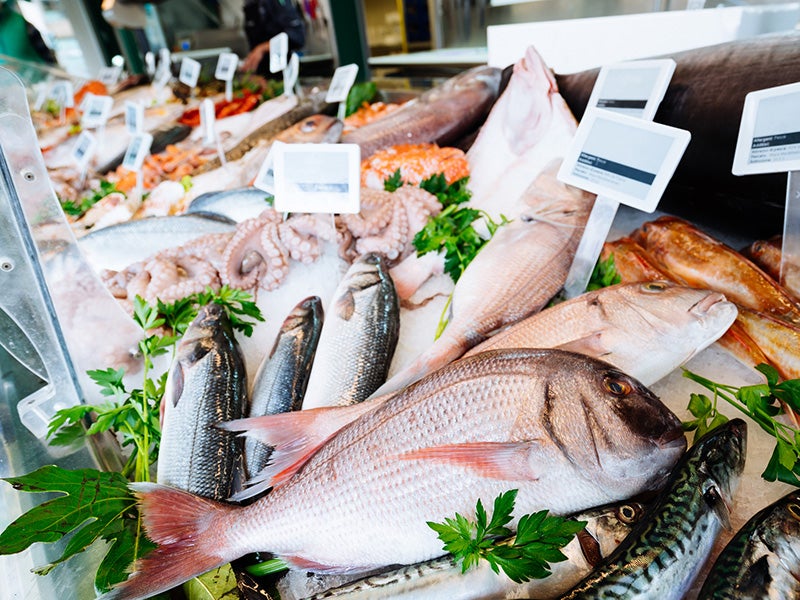Court Upholds Rule Requiring Traceability for At-Risk Seafood Imports
New rule will reduce amount of illegally caught and mislabeled seafood entering U.S.
Contact
A federal court yesterday upheld the U.S. government’s Seafood Import Monitoring Program, which will require some imported seafood at risk of illegal, unreported and unregulated (IUU) fishing and seafood fraud to be fully documented and traced from the fishing vessel or farm to the U.S. border.
The Commerce Department program, also known as the Seafood Traceability Rule, takes effect January 2018 and will require seafood importers of species like tuna, grouper, swordfish, red snapper and blue crab to provide specific information before their products can enter the United States, including what kind of fish it is, as well as how and where it was caught or farmed.
“This ruling is a huge win for U.S. fishermen and consumers who are cheated when illegally caught or mislabeled seafood products make their way into our markets,” said Beth Lowell, senior director for illegal fishing and seafood fraud at Oceana. “It’s time for imported seafood to be held to the same standards as domestically caught fish. It’s time to level the playing field for U.S. fishers and reduce the risks facing U.S. consumers. All seafood sold in the U.S. should be safe, legally caught and honestly labeled.”
The National Fisheries Institute and eight individual seafood companies filed a lawsuit in January claiming, among other things, that the final Seafood Traceability Rule was signed by “a low-level bureaucrat” without the authority to do so. In June, Secretary of Commerce Wilbur Ross ratified the rule at the request of the judge, resolving that claim.
In May, Oceana (represented by Earthjustice), the Center for Biological Diversity and the Natural Resources Defense Council filed a joint amicus brief in support of the Seafood Traceability Rule. Yesterday’s decision is in response to the remaining claims of the lawsuit.
“This is a major victory against the illegal fishing that’s devastating many fish populations and killing imperiled wildlife like turtles and porpoises around the world,” said Miyoko Sakashita, oceans program director at the Center for Biological Diversity. “Massive fishing operations working totally outside the law are rampant on the high seas and in foreign waters. This rule helps ensure that American consumers aren’t supporting such deplorable fishing practices.”
The U.S. currently imports more than 90 percent of its seafood, yet a recent study estimated that between 20–32 percent of wild-caught seafood crossing our borders comes from IUU fishing.
“Illegal fishing and seafood fraud are putting ocean health at risk, and stamping them out is a goal we can all agree on,” said Molly Masterton, an attorney with the Oceans Program at NRDC. “Yesterday’s ruling is a major advance, because this rule is a key first step in detecting and thwarting these practices at the border. By shedding a light on these elusive activities and empowering agencies to take enforcement action, the Traceability Rule will protect our oceans, along with U.S. and international fishermen who play by the rules.”
“If you believe that you are what you eat, you need to have confidence in what you’re eating,” said Steve Mashuda, an attorney at Earthjustice representing Oceana in the case. “This decision upholding the Seafood Traceability Rule helps provide much-needed assurance that imported seafood does not come with the hidden costs of overfishing, human rights abuses, or marine habitat destruction.”
Background
Oceana’s investigations of fish, shrimp, crab cakes and most recently salmon, in retail markets and restaurants found that, on average, about one-third of the seafood examined was mislabeled—the product listed on the label or menu was different than what the buyer thought they had purchased, often a less desirable or lower-priced species. Oceana has observed threatened species being sold as more sustainable, expensive varieties replaced with cheaper alternatives and fish that can cause illness substituted in place of those that are safer to eat.
According to Oceana’s global review of seafood fraud in 2016, mislabeling rates in the EU dropped following the implementation of similar measures to combat IUU fishing, from 23 percent in studies conducted before 2012 to 8 percent in 2015.
An Oceana poll from September 2016 found that 83 percent of Americans support new requirements focused on eliminating seafood fraud in the United States, including requiring that key information follows our seafood from boat to plate, such as what type of fish it is, and how and where it was caught or farmed.

Additional Resources
About Earthjustice
Earthjustice is the premier nonprofit environmental law organization. We wield the power of law and the strength of partnership to protect people's health, to preserve magnificent places and wildlife, to advance clean energy, and to combat climate change. We are here because the earth needs a good lawyer.